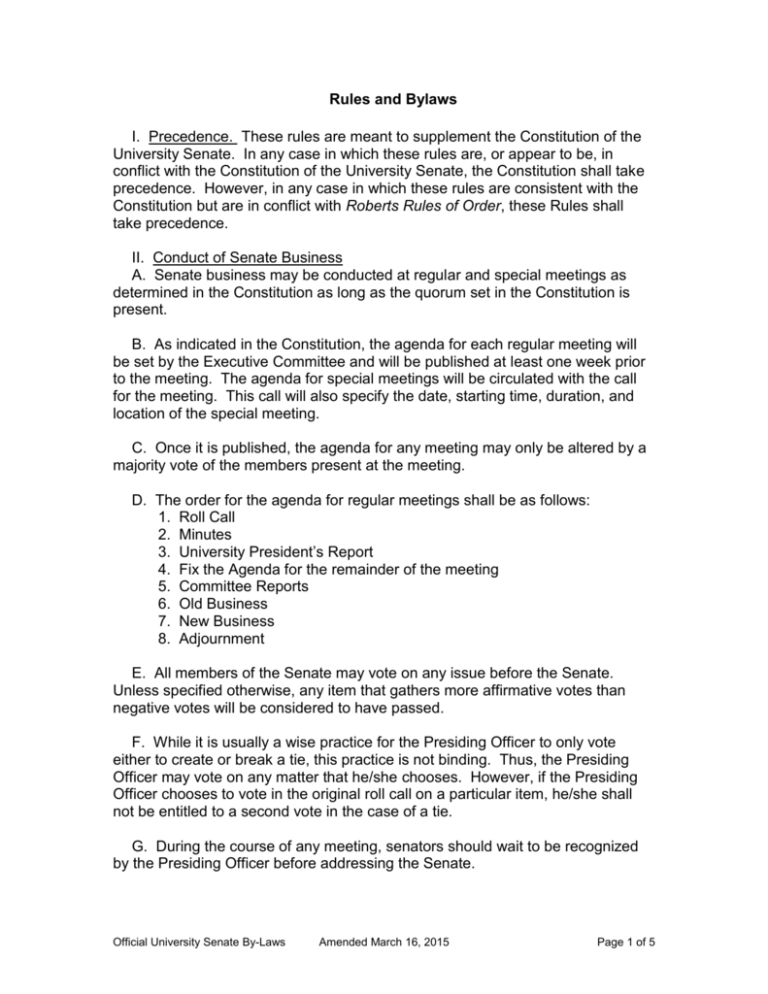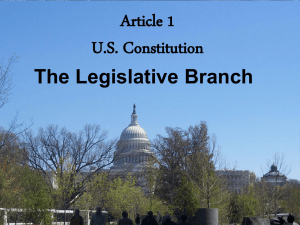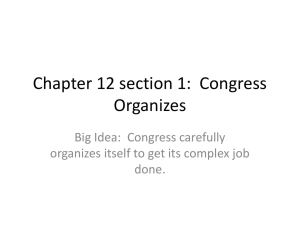Rules and By-Laws
advertisement

Rules and Bylaws I. Precedence. These rules are meant to supplement the Constitution of the University Senate. In any case in which these rules are, or appear to be, in conflict with the Constitution of the University Senate, the Constitution shall take precedence. However, in any case in which these rules are consistent with the Constitution but are in conflict with Roberts Rules of Order, these Rules shall take precedence. II. Conduct of Senate Business A. Senate business may be conducted at regular and special meetings as determined in the Constitution as long as the quorum set in the Constitution is present. B. As indicated in the Constitution, the agenda for each regular meeting will be set by the Executive Committee and will be published at least one week prior to the meeting. The agenda for special meetings will be circulated with the call for the meeting. This call will also specify the date, starting time, duration, and location of the special meeting. C. Once it is published, the agenda for any meeting may only be altered by a majority vote of the members present at the meeting. D. The order for the agenda for regular meetings shall be as follows: 1. Roll Call 2. Minutes 3. University President’s Report 4. Fix the Agenda for the remainder of the meeting 5. Committee Reports 6. Old Business 7. New Business 8. Adjournment E. All members of the Senate may vote on any issue before the Senate. Unless specified otherwise, any item that gathers more affirmative votes than negative votes will be considered to have passed. F. While it is usually a wise practice for the Presiding Officer to only vote either to create or break a tie, this practice is not binding. Thus, the Presiding Officer may vote on any matter that he/she chooses. However, if the Presiding Officer chooses to vote in the original roll call on a particular item, he/she shall not be entitled to a second vote in the case of a tie. G. During the course of any meeting, senators should wait to be recognized by the Presiding Officer before addressing the Senate. Official University Senate By-Laws Amended March 16, 2015 Page 1 of 5 H. No official business of the Senate may be conducted after 5 P.M. for regular meetings or after the announced duration for special meetings. III. Committees and Subcommittees A. As indicated in the Constitution there shall be a standing Rules and Bylaws Committee. B. At any regular or special meeting of the Senate additional standing and ad hoc committees and subcommittees may be proposed by the members of the Senate. Unless the proposal for the new committee was presented in the report of the Rules and Bylaws Committee, such proposals shall be referred to the Rules and Bylaws Committee for review and for the writing of the formal charge for the committee. The rules and Bylaws Committee will report back to the Senate at its next regular meeting that is at least one week after the meeting at which the committee was first proposed. In extreme cases where delay is not desirable, if the proposal for the new committee receives an affirmative vote from a majority of all of the members of the Senate present at the meeting, then the committee may be approved without the review of the Rules and Bylaws Committee. C. At the first meeting of each Senate Session, the full Senate shall approve or alter, as necessary, the existing committee structure. A majority vote of the Senators present will be required to alter the committee structure. D. In addition to the constitutionally mandated Rules and Bylaws Committee, the following standing committees shall be formed: 1. Committee on Diversity 2. Facilities Committee 3. Student Affairs Committee 4. Budget and Planning Committee 5. Instructional Resources and Technology Committee 6. Research Committee 7. Orientation Committee 8. Nominations and Elections Committee 9. Academic Affairs Committee E. The membership of these committees, in accordance with the rules below for each committee and excepting specific appointments outlined in those rules, shall be recommended by the Executive Committee to the full senate for their approval. F. Committee on Diversity 1. The Committee on Diversity will advise the Senate on all matters relating to developing a campus climate that supports diversity, including, but not limited to the recruitment and retention of a diverse faculty, staff and student Official University Senate By-Laws Amended March 16, 2015 Page 2 of 5 body. The Committee shall report regularly to the Senate on matters of diversity relating to traditionally underrepresented groups in enrollment, staffing, equal opportunity and access. 2. The membership of the Committee on Diversity shall be comprised of six unrestricted senators. The Director of the Office of Diversity and Equal Opportunity shall be an ex-officio member of the committee. G. Facilities Committee 1. The Facilities Committee will advise the Senate on all matters involving the utilization, maintenance, and improvement of the university’s existing or future buildings and other facilities. 2. The membership of the Facilities Committee shall be comprised of the Vice President for Finance and Administration or his or her designee and six unrestricted senators. H. Student Affairs Committee 1. The Student Affairs Committee will advise the Senate on all matters related to aspects of student life. The Committee will pay special attention to those aspects of student life that relate directly to the educational process. 2. The membership of the Student Affairs Committee shall be comprised of the Vice President for Student Affairs or his or her designee, the President of the Student Senate, two other student senators, and four unrestricted senators. I. Budget and Planning Committee 1. The Budget and Planning Committee will advise the Senate on all matters relating to the development, approval, and long-term implications of the University budget on the University’s mission. The Committee will make recommendations with regard to the University’s Master Plan and all other long range planning. 2. The membership of the Budget and Planning Committee shall be comprised of one faculty member each from the Schools of Arts and Sciences, Professional Studies, Health Sciences and Human Performance, one nonclassroom faculty member, one student, and two unrestricted members of the senate. The University President, the Provost and the Vice President for Finance and Administration may each select a designee to serve on this committee. J. Instructional Resources and Technology Committee 1. The Instructional Resources and Technology Committee will advise the Senate on all issues relating to the traditional library and technologybased information resources, audio-visual equipment, academic computing services for labs, classrooms, and distance education and all major issues of policy and procedure related to campus technology, including plans for the acquisition, distribution, and the effective and efficient use of technology. Official University Senate By-Laws Amended March 16, 2015 Page 3 of 5 2. The membership of the Technology Committee shall be comprised of six unrestricted senators. The Vice President for Finance and Administration and the Provost may each select one designee to serve on this committee. K. Research Committee 1. The Research Committee will advise the Senate on matters relating to research and scholarly work carried out at the University, including, but not limited to, the adequate availability of facilities, resources and support for research by faculty, graduate students, and undergraduate students. 2. The membership of the Research Committee shall be comprised of the Dean of the Graduate School, a representative from ESU’s Institutional Review Board and six unrestricted senators. L. Orientation Committee 1. The Orientation Committee will orient new and/or existing members to the University Senate. Topics may include, among other things: a. The purpose and function of the University Senate b. Membership responsibilities c. Roberts Rules of Order d. Debate Decorum 2. The Orientation Committee shall be comprised of at least three unrestricted senators. M. Nominations and Elections Committee 1. The Nominations and Elections Committee will solicit nominations to fill the positions of elected Senate officers, and will submit the list of nominees to the members of the executive committee at least one week prior to the meeting during which elections are held; however, nominations may still be made from the floor of Senate prior to the election of officers. 2. The Nominations and Elections Committee shall conduct the elections of elected Senate officers. 3. The Nominations and Elections Committee shall be comprised of five unrestricted senators; however, no current Senate officer or Senator who is nominated for senate officer shall serve on the committee. N. Academic Affairs Committee 1. The Academic Affairs Committee will advise the Senate on matters pertaining to those academic plans, programs, rules, and regulations that are of concern to the University as a whole. 2. The membership of the Committee on Academic Affairs shall be the Provost or his or her designee, one Academic Dean, the Chair of the University-Wide Curriculum Committee, one faculty member each from each school or college, one non-classroom faculty member and two student senate members (one selected by the Student Senate President). Official University Senate By-Laws Amended March 16, 2015 Page 4 of 5 O. All Senate Standing Committees shall, whenever possible: 1) Submit materials, including arguments for and against proposals, in advance of the meeting so that the membership has an opportunity to review and discuss the material with their peers. 2) Submit annual reports of session activities. 3) Annually review policies and procedures under their purview to make suggestions for changes and additions. Official University Senate By-Laws Amended March 16, 2015 Page 5 of 5








